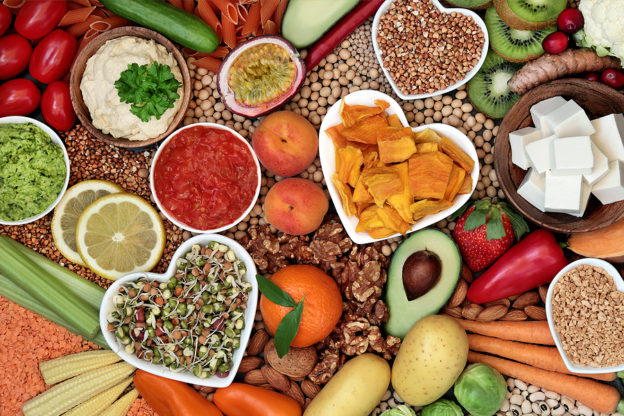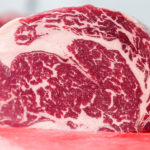By David Blyweiss, M.D., Advanced Natural Wellness
July 19, 2021
I’ve been limiting my intake of meat for quite a while now. But I still enjoy it on occasion.
My absolute favorite is grass-fed New Zealand lamb. I pierce the top of the meat with a series of holes and fill each opening with a clove of garlic. Then, I cover the entire thing with organic ketchup to keep it moist and pop it into the oven.
It’s absolutely delicious. The garlic caramelizes, the ketchup keeps it moist and gives it a little shell. When you slice into it, the meat’s soft, rich, delicious and moist.
As tasty as it is, you probably wonder why I don’t eat it more often.
Well, when we eat animal products, we generate something called trimethylamine, or TMA for short. It doesn’t matter whether it’s meat, cheese, eggs or dairy. These feed bad bacteria in our guts that generate TMA and gram-negative bacteria that produce lipopolysaccharides (LPS).
MD Exposes the Hidden Danger to Your Eyes

When your eyesight starts to fail, it's a real problem. Suddenly you can't go to the grocery store... you can't get to the doctor if you have an emergency... you can't meet your friends for dinner…
Your "regular" doctor doesn't have time to keep up with the latest research. And the same goes for eye doctors. They go to school to learn how to fit you for glasses and contacts, but have no way of preventing the damage and loss of eyesight that threatens your freedom and independence.
Let me show you something that explains a LOT about how your eyes work.
In my FREE Special Report, I'll show you a HUGE, untapped resource for your eyes that safely and naturally restores clear, effortless eyesight.
Click here to get started...
This is all bad. Those bacteria continue grow and generate more and more TMA that goes from your gut to your liver, where it’s converted to TMAO. The more animal products you eat, the more TMAO is generated… and the less able your kidneys are to get rid of it. So it starts building up. And you won’t believe how quickly it accumulates!
That’s terrible news for your cardiovascular health, because TMAO is shown to be a big factor in cardiovascular incidents, like heart attack and stroke.
TMAO promotes inflammation, plaque buildup in the arteries and “sticky” blood. These are all major factors in your chances of suffering a cardiovascular event. Even worse, higher TMAO levels produce more massive strokes of greater severity.
It’s also hard on your kidneys. The more regularly you eat foods that contribute to TMAO, the greater your risk of developing chronic kidney disease.
It’s all About the Foods You Eat
What’s interesting is that vegans and vegetarians basically don’t have TMAO. This is why they’re generally healthier and not having cardiovascular events. (Well, unless they smoke, drink or eat a lot of sugar.)
What’s also interesting is we don’t know which bacteria causes it. But we do know that a vegan/vegetarian diet will generate more beneficial bacteria in your gut so that you don’t make the TMA that produces TMAO.
And here’s the thing. If you go from an animal product diet to a vegan diet, it only takes a week or two for your TMA to drop to safe levels. Your kidneys will automatically start flushing those high levels of it out of your body.
The World's Quickest Solution for Ending Prostate and Urinary Misery
This has recently been revealed to be one of the only real breakthroughs in prostate health.
The seeds of a strange fruit (sometimes called "Chinese Apples") hold powerful phytonutrients that are a revolution in prostate health.
In fact, UCLA and Veterans Administration research have now proved this to be true.
Not only that, but it may be the worlds quickest solution for ending prostate misery.
Simply stated, these phytonutrients represent a huge step beyond beta sitosterol, saw palmetto, and other phytosterols alone.
Simply click HERE if you want to have fast prostate relief...restful, uninterrupted sleep...no more constant "urges to go"...enhanced virility...and optimal prostate support for life.
Then, if you only eat animal products one day a week or so, you won’t make nearly as much bad bacteria because you don’t have a lot of TMA. This means you could be a vegetarian or a vegan for six days of the week, then have your steak dinner – or your ham or turkey dinner – on Sunday.
So when you add in this one, single meat-eating day, you’re not going affect your gut too much.
You can learn more about eating a healthy, plant-based diet for your gut here.
How to Fast-Track TMAO Clearance
To speed up TMAO clearance even further, try adding more cold-pressed extra virgin olive oil, balsamic vinegar and red wine to your diet. These items are rich in something called DMB, which helps to stop your gut bacteria from producing TMAO.
Resveratrol can also help. It not only inhibits TMAO production, it also helps thin out the sticky effect TMAO has on your blood. This, in turn, can greatly reduce your risk of a major cardiovascular event. I recommend at least 100 mg of resveratrol each day. Add 25 mg of pterostilbene (a close cousin to resveratrol) to help keep your TMAO levels in check.
Add a probiotic to your daily regimen. Look for a formula that contains a prebiotic along with multiple strains of lactobacillus, bifidobacteria and other healthy bacteria. The higher the colony count, and the more live strains involved, the better off you’ll be. Just make sure to take it daily with food.
By the way, it’s easy enough to get your TMAO levels tested. It’s a simple blood test that your doctor can order for you from Quest, Labcorp or another diagnostic lab.
SOURCES:
Li XS, Obeid S, Klingenberg R, Gencer B, Mach F, Räber L, Windecker S, Rodondi N, Nanchen D, Muller O, Miranda MX, Matter CM, Wu Y, Li L, Wang Z, Alamri HS, Gogonea V, Chung YM, Tang WH, Hazen SL, Lüscher TF. Gut microbiota-dependent trimethylamine N-oxide in acute coronary syndromes: a prognostic marker for incident cardiovascular events beyond traditional risk factors. Eur Heart J. 2017 Mar 14;38(11):814-824.
Nam HS. Gut Microbiota and Ischemic Stroke: The Role of Trimethylamine N-Oxide. J Stroke. 2019;21(2):151-159.
Weifei Zhu, Kymberleigh A. Romano, Lin Li, Jennifer A. Buffa, Naseer Sangwan, Prem Prakash, Aaron N. Tittle, Xinmin S. Li, Xiaoming Fu, Charlie Androjna, Anthony J. DiDonato, Kimberly Brinson, Bruce D. Trapp, Michael A. Fischbach, Federico E. Rey, Adeline M. Hajjar, Joseph A. DiDonato, Stanley L. Hazen. Gut microbes impact stroke severity via the trimethylamine N-oxide pathway. Cell Host & Microbe. Online June 2021.
Tang WH, Wang Z, Kennedy DJ, Wu Y, Buffa JA, Agatisa-Boyle B, Li XS, Levison BS, Hazen SL. Gut microbiota-dependent trimethylamine N-oxide (TMAO) pathway contributes to both development of renal insufficiency and mortality risk in chronic kidney disease. Circ Res. 2015 Jan 30;116(3):448-55.
Wang Z, Roberts AB, Buffa JA, et al. Non-lethal Inhibition of Gut Microbial Trimethylamine Production for the Treatment of Atherosclerosis. Cell. 2015;163(7):1585-1595.
Chen ML, Yi L, Zhang Y, et al. Resveratrol Attenuates Trimethylamine-N-Oxide (TMAO)-Induced Atherosclerosis by Regulating TMAO Synthesis and Bile Acid Metabolism via Remodeling of the Gut Microbiota. mBio. 2016;7(2):e02210-e2215.
Din AU, Hassan A, Zhu Y, Yin T, Gregersen H, Wang G. Amelioration of TMAO through probiotics and its potential role in atherosclerosis. Appl Microbiol Biotechnol. 2019 Dec;103(23-24):9217-9228.







